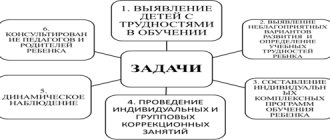Photo source gpointstudio/freepik
A defectologist is a specialist who works with children who have mental or physical disabilities. A person in this profession has knowledge of methods for adapting children to the environment, and is engaged in their training and education.
Areas of work of a defectologist
A defectologist works with problem children, studies their shortcomings, educates them, and helps them adapt to environmental conditions. The task of a defectologist is to identify developmental anomalies, including their origin, patterns and features, and based on the information obtained, correction methods are developed.
The profession of “defectologist” requires knowledge in many areas: psychology, neurology, pedagogy, etc. A specialist in this profile diagnoses the child’s abilities and level of development. The result of the work of a defectologist is the socialization and inclusion of children with developmental disabilities in the world around them. Along with this, a specialist in this profile conducts conversations with parents, providing them with assistance in raising and understanding their child.
Thus, the job responsibilities of a defectologist are:
- organizing and conducting educational and correctional work with children with developmental disabilities;
- examination of children to determine the severity of the existing defect;
- conducting group and individual classes to restore impaired functions;
- consulting parents on the use of methods and techniques to help problem children;
- records management.
A defectologist is a socially significant specialty that requires deep professional knowledge and a desire to help children.
Defectology and its types
This science is divided into several branches depending on the type of disease. There are the following types of defectology:
- speech therapy – deals with the correction of various speech deviations;
- orthopedagogy - work with defects of the musculoskeletal system;
- deaf pedagogy - studies hearing problems;
- Typhlopedagogy - studies visual impairments;
- oligophrenopedagogy is a science whose specialists focus on helping children suffering from decreased intelligence.
In your free time from studying, you can earn extra money
on freelance exchanges (by writing comments, reviews, or simple actions on social networks) - choose what you like best and start earning money!Often, a defectologist encounters children who have combined defects. According to statistics, about 40% of children with disabilities have multiple disabilities. That is why a specialist must understand all branches of defectology.
The tasks of a teacher when working with children are:
- a complete and thorough study of the child’s developmental characteristics;
- identification of deviations and defects of any kind;
- training in spatial orientation, literacy and mathematical fundamentals;
- improving attention, memory, thinking, perception in children;
- development of speech, motor skills, communication skills;
- assistance in the socialization and adaptation of the child to real life.
In addition to conducting group or individual classes, the defectologist advises parents and teaches them all the necessary skills for properly raising a child with special needs. A correctional specialist should not treat diseases that caused the development of defects; only doctors do this.
Differences from a speech therapist
Many people do not know what the difference is, so when there is a need to get advice, the question arises which specialist should be contacted. In fact, the difference is noticeable.
A speech therapist works with healthy children who have incorrect pronunciation of certain sounds or words. Such a highly focused specialist performs various exercises with the child to correct speech and develop correct pronunciation.
A speech pathologist helps children whose speech defects are caused by various diseases or developmental delays. This is a generalist.
How to understand what you need to contact
A professional consultation with a defectologist will help you find out whether the child has any disorders and whether treatment is necessary. A visit to a specialist is necessary if the baby has at least one of these signs:
- at 7 months does not respond to parents’ speech addressed to him, does not turn his head when his name is called;
- per year does not yet babble 8-10 very basic words;
- at 2 years old does not speak light words, communicates mainly using gestures;
- at 2 years and 6 months is not able to formulate a simple phrase;
- at 3 years old there are problems with articulation, does not stick out his tongue when asked, does not swallow saliva;
- At 5 years old, a preschooler cannot make a simple sentence or describe a picture in his own words;
- the child stutters;
- is lagging behind in mental development;
- has central nervous system disorders;
- there are problems with hearing or vision;
- suffers from mental disorders.
If there are any doubts, it is better to dispel them by visiting a consultation with a defectologist. In addition, the earlier classes begin, the easier it is to achieve a positive result.
Working methods
The main responsibility of a special education teacher is to create conditions for the maximum possible development and adaptation of children with disabilities to ordinary life. The work includes examining patients and determining the severity of the deviation, recruiting groups for joint classes, developing an individual training plan taking into account all the features, consulting parents and teachers on educational methods.
First, the child undergoes a consultation during which a defectologist conducts a comprehensive diagnosis to study mental functions. At this stage, the specialist finds out what deviations are present and whether there is a need to attend classes.
Requirements for a defectologist
Photo source prostooleh/freepik
Among the professional requirements for a defectologist are the following:
- availability of higher professional education;
- work experience in the specialty;
- knowledge of developmental and special pedagogy and psychology, anatomical-physiological and clinical defectology;
- knowledge of methods and techniques for preventing and correcting developmental disorders;
- the desire for professional growth and familiarity with the latest discoveries in one’s field (attending advanced training courses, master classes, seminars, conferences, reading professional literature, etc.).
Not everyone is capable of working as a defectologist. If you have a diploma and professional knowledge, a specialist requires work experience and the possession of certain character qualities.
A defectologist is a specialist who works with children who have psychological or physical developmental disabilities. This profession is complex, requiring the employee to have deep knowledge and certain personal qualities. To work as a defectologist, you need to obtain a higher education. The job responsibilities of a specialist in this profile include examining children, identifying deficiencies, searching for the cause of the disease, helping them adapt to the outside world, etc.
What education does a defectologist need?
It is possible to obtain education as a defectologist at pedagogical universities (specialty code 44.03.03). During the training process, the student learns the basics of pedagogy, methods of providing psychological and medical assistance, etc. Therefore, it can be argued that a defectologist has a pedagogical education with a medical bias.
The profession of a defectologist is divided into several narrow specialties, such as:
- teacher of the deaf (works with children with hearing impairments);
- typhlopedagogue (works with children with visual impairments);
- teacher of deafness (works with deaf-blind children);
- oligophrenopedagogue (works with mentally retarded children);
- speech pathologist (works with children with speech disorders and defects), etc.
How to remotely obtain qualifications as a teacher-defectologist at the Academy
If you have a university diploma, you can undergo a professional retraining program at the Academy. You can choose one of the areas of special pedagogy: Defectology, Speech Therapy, Typhlopedagogy, Oligophrenopedagogy. After completing it, you will receive a diploma with a qualification and learn how to effectively manage the development process of a child with disabilities.
Training takes place in a distance format. You sign up for the program and complete it in a convenient schedule, at any time convenient for you in the LMS system on the Academy website.
There is no need to install any additional software. The program meets the requirements of the Federal State Educational Standard and professional standards, and the Academy has a state educational license, so having this diploma and knowledge from the course will give you the opportunity to work in various institutions as a special education teacher.
The program developers are highly qualified specialists with extensive experience. Each student receives individual support; all questions during the training process are answered by an assigned methodologist.
Upon completion of training, a diploma of professional retraining of the established form is issued with the assignment of qualifications. The education document must be entered into the state database of the FIS FRDO and sent free of charge to any region and city of Russia.
Personal qualities of a defectologist
To work with abnormal children and perform professional duties, a defectologist must have certain personal qualities, which include:
- patience, balance, stress resistance;
- responsibility;
- ability to work with difficult children;
- love for children and your profession;
- communication skills.
When working with a child, a defectologist must see his pupil as a full-fledged person, show interest in everyone, observe, identify the causes of deviations, try to provide help, prevent possible undesirable consequences, etc.
Finding a job as a speech pathologist (career growth)
In Russia, the work of a defectologist is in demand and highly paid. This is due to the fact that many modern children have problems adapting to environmental conditions (changes), cannot communicate with peers, have problems with speech and learning material, physical disabilities, etc. A specialist can provide private services, work in public boarding schools, correctional and rehabilitation centers, kindergartens and preschool educational institutions, etc.
Goals of a speech therapist's work
The difference between a speech therapist and a defectologist is that he often has a pedagogical education. The teacher works with healthy preschoolers or with patients suffering from minor speech impairments. A speech therapist-teacher (teacher) works in kindergartens (preschool educational institutions) and schools.
Specialist tasks:
- Triggering speech activity in the absence of speech before treatment.
- Making gestures, training facial muscles during a conversation.
- Working with gross and fine motor skills.
- Bringing sound reproduction to automaticity.
- Training thinking and memory.
- Increasing vocabulary.
- Teaching a child to speak correctly, construct sentences, and form a dialogue, which further helps to develop coherent, competent speech.
- Forming the ability to hear sounds and recognize them in the conversations of others.
- Teaching writing, improving writing literacy among schoolchildren.
Before visiting a speech therapy specialist, the patient must be examined by a neurologist, otolaryngologist, or psychologist. If the preschooler does not have serious illnesses, the specialist draws up a speech therapy report and lesson plan. A speech therapist often works with healthy children in a kindergarten or school. At the request of parents, classes can be held at home.
A speech therapist accepts preschoolers for correction starting from the age of 3.
Defectologist salary
Photo source prostooleh/freepik
The salary of a speech pathologist in Russia depends on the region of residence and place of work. Thus, in government institutions, the salary of a specialist in this profile can be 15-20 thousand rubles, in Moscow and St. Petersburg - 35-60 thousand rubles. Work in private institutions (including the provision of private professional services) pays more. An employee can receive up to 80 thousand rubles per month. and higher (depending on job responsibilities).










